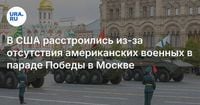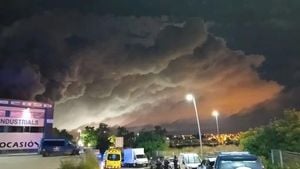On May 9, 2025, the United States ambassador to Russia, Lynn Tracy, made headlines by choosing to skip the parade commemorating the 80th anniversary of Victory in the Great Patriotic War. This decision was reported by the Russian news agency TASS, which noted that "the representative of the American embassy was not present in the stands during the parade."
The parade, held in Moscow's Red Square, concluded around 11 a.m. local time and featured over 11,500 military personnel from various branches of the Russian Armed Forces, including more than 1,500 participants from the ongoing special military operation. The event is traditionally a significant occasion in Russia, marking the nation's victory over Nazi Germany during World War II.
Despite the absence of the U.S. ambassador, Tracy had previously participated in a flower-laying ceremony at the Tomb of the Unknown Soldier in Moscow on April 25, 2025. This ceremony was highlighted by Russian Foreign Ministry spokeswoman Maria Zakharova, who described it as one of the key events organized for foreign diplomats in honor of the anniversary.
The decision to not attend the parade has raised eyebrows and sparked discussions about the current state of U.S.-Russia relations, which have been strained in recent years due to various geopolitical tensions. The absence of a U.S. representative at such a pivotal event could be interpreted as a cold diplomatic gesture amidst ongoing international disputes.
In recent years, the U.S. and Russia have found themselves at odds over a multitude of issues, including military conflicts and allegations of election interference. The diplomatic rift has made public appearances by officials from both nations increasingly scrutinized.
As the parade unfolded in Moscow, Russian President Vladimir Putin delivered a speech emphasizing the importance of the day and honoring those who fought in the war. He spoke about the sacrifices made during the conflict and the need to remember the lessons of history. The absence of Tracy was noted, as the U.S. has historically participated in such commemorative events to foster goodwill.
While the parade showcased military might, it also served as a reminder of the historical ties and conflicts that have shaped U.S.-Russia relations. The decision by Tracy not to attend could be seen as a reflection of the current political climate and the complexities involved in diplomatic engagements.
International observers have pointed out that such decisions can have significant implications for future diplomatic interactions. The choice to skip the event could signal a broader trend of distancing between the two nations, particularly in light of ongoing military operations and political disagreements.
In contrast, other nations often send representatives to these events as a sign of respect and acknowledgment of historical sacrifices. The U.S. has previously participated in various commemorative events, which has led to questions about the future of American involvement in similar occasions.
As the world watches the developments in U.S.-Russia relations, the absence of Tracy at the Victory Day parade may serve as a poignant reminder of the challenges that lie ahead. The complexities of international diplomacy require careful navigation, and such decisions can resonate far beyond the immediate context of a single event.
In the days following the parade, reactions from political analysts and commentators varied, with some suggesting that the U.S. should have taken the opportunity to engage with Russia in a spirit of cooperation. Others argued that the decision to abstain was justified given the current geopolitical tensions.
The Victory Day celebrations, which have deep historical significance in Russia, are often seen as a platform for reaffirming national pride and unity. The absence of the U.S. ambassador could be interpreted as a missed opportunity for dialogue and reconciliation.
As the anniversary of the Great Patriotic War continues to evoke strong emotions in Russia, the implications of diplomatic gestures like Tracy's absence will likely linger in the minds of both Russian officials and international observers. The event not only commemorates a historical victory but also serves as a backdrop for ongoing discussions about peace, conflict, and international relations.
The complexities of modern diplomacy mean that every action, or inaction, is weighed carefully. The decision by Lynn Tracy to skip the parade may have been a calculated move, reflecting the current state of U.S.-Russia relations, but it also highlights the delicate balance that diplomats must maintain in a world fraught with tension.
As nations around the world continue to grapple with their historical narratives and current political realities, the significance of events like the Victory Day parade remains ever relevant. The interplay between memory, national pride, and diplomatic engagement will shape the future of international relations for years to come.




